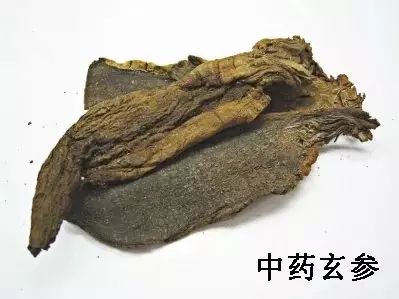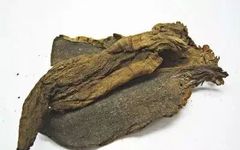Although traditional Chinese medicine (TCM) is beneficial, it is not without side effects. Always consult a local TCM practitioner for proper diagnosis and treatment!

1. **Xuan Shen** (玄参) – Xuan Shen is the root of the plants Scrophularia ningpoensis and Scrophularia buergeriana, containing iridoid glycosides, volatile oils, and alkaloids. Pharmacological studies have shown that Xuan Shen extracts can lower blood pressure, dilate blood vessels, and have cardiotonic effects. TCM considers it cold in nature, with a sweet and bitter taste, and functions to nourish yin, clear heat, cool the blood, and detoxify. It is suitable for symptoms such as thirst due to heat, rashes, bone steaming, insomnia, spontaneous sweating, and sore throat. Dosage: 6-12 grams; avoid in cases of diarrhea or excessive phlegm-dampness.
2. **Jue Ming Zi** (决明子) – Jue Ming Zi is the seed of the plant Cassia obtusifolia, containing anthraquinones and vitamins. Pharmacological studies indicate that it can lower blood pressure and serum cholesterol, and has laxative effects. TCM regards it as slightly cold, with a sweet and bitter taste, functioning to clear the liver, brighten the eyes, promote urination, and relieve constipation. It is effective for symptoms like red, painful eyes due to liver heat, hypertension, hepatitis, and habitual constipation. Dosage: 3-9 grams, crushed and decocted.
3. **Di Gu Pi** (地骨皮) – Di Gu Pi is the root bark of Lycium barbarum, containing chlorogenic acid and various phenolic compounds. It has significant antipyretic effects and can lower blood sugar and cholesterol levels. TCM considers it cold, with a sweet and bland taste, functioning to cool the blood, clear heat, and relieve symptoms of heat-related conditions such as night sweats, cough, and hypertension. Dosage: generally 3-9 grams.
4. **Lu Gen** (芦根) – Lu Gen is the rhizome of the plant Phragmites australis, containing various nutrients. TCM considers it cold, with a sweet taste, functioning to clear heat, generate fluids, and relieve thirst. It is suitable for heat-induced thirst, vomiting, and cough. Dosage: generally 9-30 grams for dried, 15-40 grams for fresh.
5. **Lian Qiao** (连翘) – Lian Qiao is the fruit of Forsythia suspensa, containing volatile oils and flavonoids. Pharmacological studies show it has broad-spectrum antibacterial effects. TCM considers it slightly cold, with a bitter taste, functioning to clear heat, detoxify, and reduce swelling. It is suitable for conditions like febrile diseases, abscesses, and allergic purpura. Dosage: generally 6-9 grams.
6. **Mu Dan Pi** (牡丹皮) – Mu Dan Pi is the root bark of Paeonia suffruticosa, containing paeonol and other compounds. It has been shown to lower blood pressure and has analgesic and anti-inflammatory effects. TCM considers it cool, with a bitter and pungent taste, functioning to clear heat, cool the blood, and alleviate pain. It is suitable for symptoms like bleeding and abscesses. Dosage: 5-9 grams; avoid in cases of spleen and stomach deficiency.
7. **Zhi Mu** (知母) – Zhi Mu is the rhizome of Anemarrhena asphodeloides, containing saponins and flavonoids. It has significant antipyretic effects and is effective for conditions like tuberculosis and fever. TCM considers it cold, with a sweet and bitter taste, functioning to clear heat, nourish yin, and moisten dryness. Dosage: generally 6-9 grams; avoid in cases of kidney yang deficiency.
8. **Ban Lan Gen** (板蓝根) – Ban Lan Gen is the root of Isatis indigotica, containing indigo and other compounds. It has significant antiviral effects and is effective for hepatitis and skin diseases. TCM considers it cold, with a bitter taste, functioning to clear heat, detoxify, and relieve sore throat. Dosage: generally 5-9 grams; avoid in cases of spleen and stomach deficiency.
9. **Jin Yin Hua** (金银花) – Jin Yin Hua is the flower bud of Lonicera japonica, containing chlorogenic acid and flavonoids. It has anti-inflammatory and antipyretic effects. TCM considers it cold, with a sweet taste, functioning to clear heat and detoxify. It is suitable for febrile diseases and skin infections. Dosage: generally 6-12 grams; avoid in cases of deficiency and diarrhea.
10. **Xia Ku Cao** (夏枯草) – Xia Ku Cao is the flower or whole herb of Prunella vulgaris, containing triterpenoid saponins. It has been shown to lower blood pressure and has antibacterial effects. TCM considers it cold, with a bitter and pungent taste, functioning to clear liver fire and relieve symptoms like red, painful eyes. Dosage: generally around 9 grams.
11. **Zhi Zi** (栀子) – Zhi Zi is the fruit of Gardenia jasminoides, containing various bitter glycosides. It has cholagogue effects and can lower temperature and relieve pain. TCM considers it cold, with a bitter taste, functioning to clear heat and detoxify. It is suitable for symptoms like jaundice and skin infections. Dosage: 3-9 grams.
12. **Pu Gong Ying** (蒲公英) – Pu Gong Ying is the whole herb of Taraxacum mongolicum, containing taraxasterol and other compounds. It has antimicrobial effects and can improve liver function. TCM considers it cold, with a sweet and bitter taste, functioning to clear heat and detoxify. It is suitable for conditions like mastitis and lymphadenitis. Dosage: 9-15 grams, crushed for external application.

